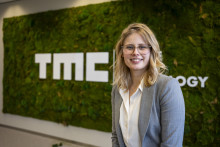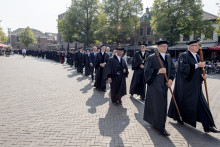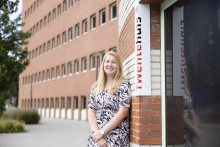Joep Dirx (25) graduated last January with a degree in Architecture at Eindhoven University of Technology. He did a Master's degree in real estate management and development. One month later, he started as a junior project manager at the Trudo Foundation, a housing corporation . 'We are responsible for the construction and renovation of social rental and owner-occupied housing,' says Dirx. He came to Trudo through an acquaintance. 'I was quite an active student and works as a board member at study association CHEOPS for a year. I am also active in the alumni association. During an alumni event, I ran into a former board member who worked at the housing corporation. She invited me to come over for a cup of coffee.'
 Truly off work
Truly off work
And that is how it happened. Since February of this year, Dirx has been taking his first steps on the job market. 'The transition from studying to working was fairly smooth for me. Before graduating, I did an eleven-month internship at a company. There, you get used to the working rhythm.' He also likes the work itself . 'I don't have to think about still having to do something for my studies all the time anymore. You're really off work after working hours. On the other hand, you are a little less flexible when it comes to meeting up. But most of my former classmates and friends are currently in the same phase of their lives, which makes a difference.'
Sense
Dirx has a three-year contract. 'I'm following a three-year internal training programme to become a project developer. This gives me opportunities to work on different projects, each of which is in a different phase of completion. I get to watch several colleagues and learn how they work.' According to him, the atmosphere within Trudo is very open. 'We have a diverse team, both young and old and anything in between. Everyone is very helpful: they will take you along and tell you all about the profession.' Of course, he had to get used to it and get a feel for things during the first few days. 'It's a new place, so you have to get a feel for how people interact with each other, but that's quite natural.'
An experience the richer
He advises others who are about to apply for jobs also to respond to job vacancies that do not seem quite up their alley: 'Do it purely for the experience and also to discover whether that direction might be something for you after all. And if not, you can cross it off your list. For instance, I applied for a traineeship at ProRail. In the end, it wasn't what I was looking for, but I did gain experience from doing it.'
‘Take your time’
Rajesh Gangireddy holds a MSc in Embedded Systems with a specialization in Computer Vision at the University of Twente (graduated April 2023). He works as AI Research Scientist at Intel.
‘The main thing that will differentiate you from any other university graduate is practical experience,’ says Rajesh Gangireddy, a recent graduate who now works as AI Research Scientist at Intel. A job he landed, as he says, partly thanks to his practical experience. ‘I did two internships during my studies, which was definitely a big advantage. If you have the chance, you should do an internship or a thesis assignment in a company in your field. This will surely help you a lot.’
 Gangireddy didn’t rely on getting the job, though. For two months, his life was dedicated to searching for vacancies in various countries. ‘My initial job search took a lot of time. I applied to about eighty or ninety companies. At first, I searched mostly via LinkedIn, but I learnt that there are better ways. I started contacting AI companies that I liked, even if they didn’t have any job vacancies, and I did get responses that way. The issue was, there are a lot of AI companies, but also a lot of competition. If they post a vacancy, there can be several hundred applicants within a couple of days.’
Gangireddy didn’t rely on getting the job, though. For two months, his life was dedicated to searching for vacancies in various countries. ‘My initial job search took a lot of time. I applied to about eighty or ninety companies. At first, I searched mostly via LinkedIn, but I learnt that there are better ways. I started contacting AI companies that I liked, even if they didn’t have any job vacancies, and I did get responses that way. The issue was, there are a lot of AI companies, but also a lot of competition. If they post a vacancy, there can be several hundred applicants within a couple of days.’
You should not get demotivated, though, stresses the young professional. ‘If your profile is good, you’ll be shortlisted no matter how many applicants there are,’ says Gangireddy. ‘On top of practical experience, I’d say keep your GitHub profile up to date and try to work on public projects, so that you can show your problem-solving skills. If you can, writing papers will definitely set you aside. This might sound like too much, but you can also convert your thesis to a paper.’
‘Keep your job hunt structured’
It's also important to keep your job hunt structured. Do your research and keep a list, recommends Rajesh Gangireddy. ‘Always read up on the company first. It will help you write your cover letter and mention exactly how you’d fit in with the company, but it will also help you realize if the company is even the right fit for you. Keep an Excel sheet of where you applied and try to follow up with them if you don’t hear anything. This worked for me on several occasions.’ Good advice, as Gangireddy was able to choose from several job offers in the end.
When searching for your first job, you should mainly remember: it takes time. ‘I was surprised with how slow the application process can go. I’ve worked here for more than six months, and I still get rejection letters from companies I applied to before. Some companies don’t reply at all. Don’t get disheartened. Take your time. This is the starting point of your career, and you need to do it right.’
4tu career special
 This article appeared in the 4TU Career Special, a shared publication by the news editors of Cursor TU Eindhoven (Technische Universiteit Eindhoven University of Technology), TU Delta (TU Delft University of Technology), Resource Wageningen UR (Wageningen University & Research) and U-Today (University of Twente).
This article appeared in the 4TU Career Special, a shared publication by the news editors of Cursor TU Eindhoven (Technische Universiteit Eindhoven University of Technology), TU Delta (TU Delft University of Technology), Resource Wageningen UR (Wageningen University & Research) and U-Today (University of Twente).



 Truly off work
Truly off work



